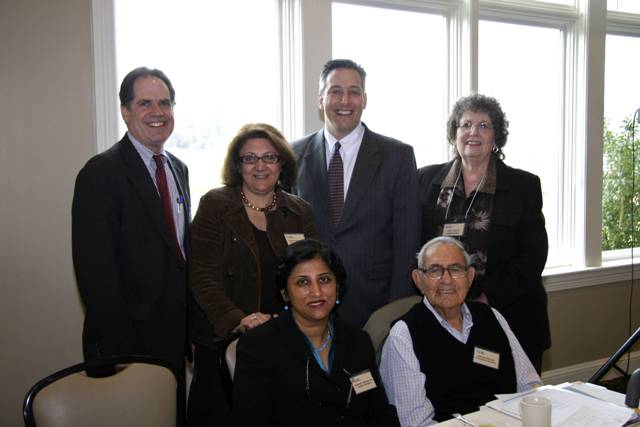For Immediate Release Media Contact: Collin Nash or Sid Nathan
March 26, 2010 (516) 869 7794
TONH’s Project Independence Elicits Praise at Recent Seminar on “Aging and Culture”

(L to R) Top Row: Receiver of Taxes Charles Berman, Shahrzad Moadel, Supervisor Jon Kaiman, Department of Services for the Aging Commissioner Evelyn Roth
Bottom Row: Dr. Margaret Abraham, Dr. Abraham Lurie
North Hempstead, NY—Project Independence, the ambitious initiative Supervisor Jon Kaiman introduced four years ago to help seniors “age in place” is a boon to North Hempstead’s increasingly diverse and growing elderly population, sociologists and social welfare experts said at a recent seminar hosted by the Town.
Because of generational differences, and in North Hempstead’s case, growing diversity and wide-ranging cultural attitudes, seniors often experience difficulty navigating the vast social services network, presenters at the March 23rd seminar, "Aging and Your Culture", agreed.
That is precisely why Project Independence is gaining widespread attention Supervisor Kaiman told residents attending the breakfast presentation at the Harbor Links Golf Course Clubhouse in Port Washington.
“As North Hempstead’s population becomes more culturally diverse, we want to grow the dialogue and help all our seniors and families better access services,” Supervisor Kaiman said.
The seminar’s guest speakers—South Asian Margaret Abraham, Iranian native Shahrzad Moadel and New York native Abraham Lurie—represented a cross-section of North Hempstead’s growing population of residents from a wide spectrum of cultures.
North Hempstead’s senior population saw a 40 percent increase in residents aged 75-84 over recent years while those older than 85 increased 60 percent, according to census statistics.
South Asian families tend to function around “intergenerational reciprocity,” said Dr. Abraham, a sociology professor at Hofstra University. Typically, she explained, senior family members care for their grandchildren while the children are expected to care for the elders.” Consequently, she added, “service providers have to take the larger family into consideration and not just the individual receiving the service.”
Moadel, the principal of a private psychology practice, pointed out that due to the various religions practiced in her culture, “a lot of cultural nuances exist in Persian’s approach to life. We tend to be very individualistic,” for example. Also, “we are often reluctant to discuss what goes on in our households.”
Despite the wide spectrum of cultural differences, said Laurie, a professor in the School of Social Work at Stony Brook University, the human condition share basic similarities.
“We all want to survive. We all want security for our families. And we all want our elders to live in a safe, nurturing environment.”
The major concerns for seniors is health care and financial security, said Laurie, whose contention was supported by a recent Newsday article noting that growing numbers of Long Island seniors simply cannot afford to retire.
Thankfully, he said, Project Independence helps fill some of the needs like transportation to supermarkets and non-emergency doctor visits, and some basic health care needs like blood pressure screenings and grief counseling. A positive step in the right direction, “Project Independence certainly helps,” he said.
##
For more photos of this event, please visit North Hempstead's facebook fanpage at www.facebook.com/townofnorthhempstead